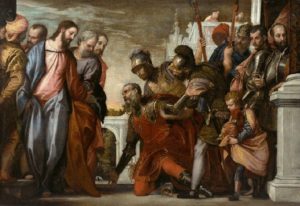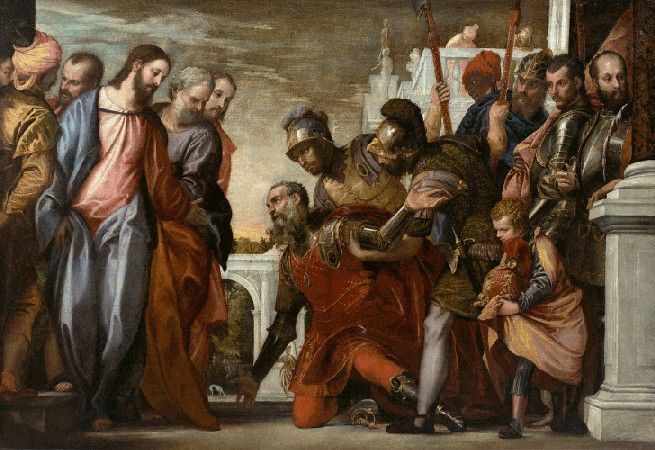
Jesus Heals a Slave,
Devotions on Luke 7:1-17
Fifth Sunday after the Epiphany
Monday, Jesus Heals a Slave
“A centurion there had a slave whom he valued highly” (Luke 7:2).
During a Habitat for Humanity build, Don Anderson worked alongside of Raul Nunez. They hammered in shingles together for an entire day. As they worked, the two men talked and they discovered they had a lot in common. A friendship was born on that roof and it grew as the two men worked together throughout the build.
Sometime later Don was enjoying a few beers with some of the guys from work. The conversation turned to undocumented immigrants and building a wall. The majority thought the immigrants should be deported. Don disagreed. He was able to share about his friendship with Raul and what he had learned about the Latino community. None of the other men associated with Latinos. For Don, a group had been transformed into people because he had a highly valued friend who was a member of the group.
The centurion acted on behalf of his slave because he valued the slave. Jesus died on the cross because we are precious in God’s sight. As disciples of Jesus we are challenged to build diverse friendships so that we, too, can highly value people and the groups of which they are members.
Lord, we love people who are like us. Empower us to love people who are different from us. Amen.
Tuesday, Jesus Heals a Slave
“He sent some Jewish elders to him [Jesus], asking him to come and heal his slaves” (Luke 7:3).
The actions of the Centurion foreshadow his message to Jesus later in the story. He is a man who understands authority. He doesn’t jump rank either, which is what he would see happening if he approached Jesus. With his slave near death, the Centurion approaches some Jewish leaders and asks that they intercede for him. (As a soldier in Rome’s army, he could have ordered them.) The Jewish leaders willing do what the Centurion asks. They approach Jesus with his request and they speak well of him.
Often people know us only by our titles and our resumes. This is not really who we are, though. It is not what people say about us when they introduce us that is important. What really matters is what they say about us when we aren’t present. As disciples of Jesus, are people talking about our love of God and our service for others? Or, do they use not so complimentary words to describe us. Our reputation both prepares the way and affirms our witness and our service.
Wonderful Lord, may our lives reflect you so that the words that people say about us give honor and praise to you. Amen.
Wednesday, Jesus Heals a Slave
“’He is worthy having you do this for him’” (Luke 7:4).
Young Brenda Yamamoto approached her parents with a demand she thought that she deserved. When they didn’t grant her request, she threw a tantrum. The result was a period of screaming and shouting by both Brenda and her parents. After the incident, the three apologized and discussed how they could avoid a similar situation in the future. “You could just give me what I want,” Brenda suggested.
The Jewish authorities approached Jesus and asked him to come to the aid of the Centurion’s servant because the Centurion deserved it. It is difficult to believe that “he deserves it” was what motivated Jesus to return with the Jewish authorities and to heal the slave. Neither did Jesus respond because it was a Centurion of the Roman army making the request. There is only one factor that motivated Jesus—love. Jesus heard about a person in need. He loved that person and responded by healing him.
There are times, in our walks of faith, when we forget and make demands of God because “we deserve it.” Thankfully we eventually come to our senses. When we do, we remember that God’s action is not based on what is deserved, but only on God’s love. God’s movement in our lives is pure grace. As disciples of Jesus, love inspires us to involve ourselves in the lives of others and serve them.
“Breathe on us, breath of God; Fill us with life anew, that we may love all that you love and do what you would do.” Amen (LBW #488).
Thursday, Jesus Heals a Slave
“I tell you not even in Israel have I found such faith” (Luke 7:9).
The Centurion demonstrated a remarkable faith. It was a faith that was very different from what Jesus had previously encountered. The Jews, to whom Jesus had ministered, saw Jesus merely as a healer. He was a man who had a gift of healing. There were many such characters running around Judah and Galilee during that time. The crowds didn’t see Jesus as the Messiah, yet. Not even the disciples had figured out who Jesus was.
Seeing Jesus from a military perspective allowed the Centurion to comprehend more clearly who Jesus was. Jesus was a man of authority. He didn’t take orders, rather he gave orders. Jesus had authority over diseases and demons. Because of this, Jesus was no mere mortal; he was something more.
Our faith is not remarkable if we only pray for something and expect (hope) Jesus will answer. Faith like that of the Centurion is faith that understands that God is a God of love and power. God has authority over everything, and God holds us in the palm of God’s hand. Such a faith does not always produce answered prayer, but it does open us up to experience the peace that passes all understanding.
Holy Spirit grant us the ability, in our journeys of faith, to rest in your steadfast love and mighty power. Amen.
Friday, Jesus Heals a Slave
“He was his mother’s only son, and she was a widow” (Luke 7:12).
Binh noticed some changes in Calvin, one of his co-workers. Cal was once the life of the party, but now was strangely quiet. Smiles were few and far between and there was an emptiness in Cal’s eyes. Concerned, Binh sat down and asked Cal if something was wrong. For the next hour, Binh listened as Cal shared how his marriage and home life were falling apart. Binh was alert. He saw another person’s need and acted on it. Love was expressed and a burden was shared.
We are not sure why Jesus stopped that particular funeral procession. He might have noticed that there was no male figure near the grieving mother. Neither were there any children. Without husband or sons, the woman was destitute. She would only be able to make a living by begging or prostitution. Jesus saw a great need and acted to meet that need.
As disciples of Jesus, we are always challenged to turn our attention away from ourselves and look at others. With our eyes not blinded by our own concerns, we can see the needs of others. Knowing the need, we can act in love and seek to meet that need. As the widow’s life was suddenly transformed, so our actions can bring about transformation, also.
Lord, there are so many people who suffer alone and in silence. Open our eyes that we may see their need and share your love and grace with them. Amen.
Saturday, Jesus Heals a Slave
“When the Lord saw her, he had compassion for her and said to her, ‘do not weep’” (Luke 7:13).
In the book of Ecclesiastes it is written, “For everything there is a season, and a time for every matter under heaven … a time to weep, and a time to laugh; a time to mourn, and a time to dance” (Ecclesiastes 3:1, 4). The widow had good reason to weep. Her son had died. Her mourning was appropriate. Whatever life she had lived before was gone. An uncertain future lay before her. Jesus stops the funeral possession and tells the widow not to weep. He had not raised the widow’s son from the dead, yet, but the time for weeping had ended. Jesus was present.
As disciples of Jesus, we are not required to go around with smiles plastered on our faces. We might live in God’s kingdom, but there is still pain, sickness and suffering this side of the resurrection. These are a part of life and sooner or later they become our lives’ experiences. We will have valid reasons to weep and mourn. When we do, Jesus will be by our sides shedding tears with us. Jesus will also be whispering in our ears, “Do not weep.” Jesus is present and his presence brings love, hope, comfort and peace.
Loving God, comfort us in our grief then help us dance to the music of life around us. Amen.
Sunday, Jesus Heals a Slave
“The dead man sat up and began to speak and Jesus gave him to his mother” (Luke 7:15).
It had been a long twenty-four hours. While camping, the Hanson’s nine year old son had wandered off into the woods. Mr. and Mrs. Hanson, along with their two other children, had frantically searched the woods for hours before calling for help. The sheriff’s department, a rescue squad and scores of volunteers searched through the night. Early the next morning, a sheriff’s car pulled up to the Hanson campsite. The deputy got out, opened up the passenger door and out scrambled the Hanson’s son. He ran to the open arms of his parents and siblings. The lost had been found.
There are times when we do not know how valuable something is until we have lost it. Finding it, brings such joy to our hearts. The widow had lost her son and her livelihood. Like all of us, she probably took her son for granted and wasn’t as thankful for the everyday things of life as she should have been. For a span of time, she had lost what was most valuable to her. Jesus raised her son from the dead and gave him back to her.
The story of the widow and her son can remind us how valuable, yet fragile, life is. It can encourage us to be thankful for all our blessings, including those we take for granted. The fact that Jesus gave back to the widow what she had lost might also help us see that one of the most important things we do is to help others find what they have lost—faith, hope, love, purpose and companionship, among other items. Ours is a very practical ministry of helping others look for the valuable things of life.
Gracious Lord, thank you for the gift of life and for all the blessings you include with that gift. Thank you for giving us what is most valuable, your love and grace. Amen.

